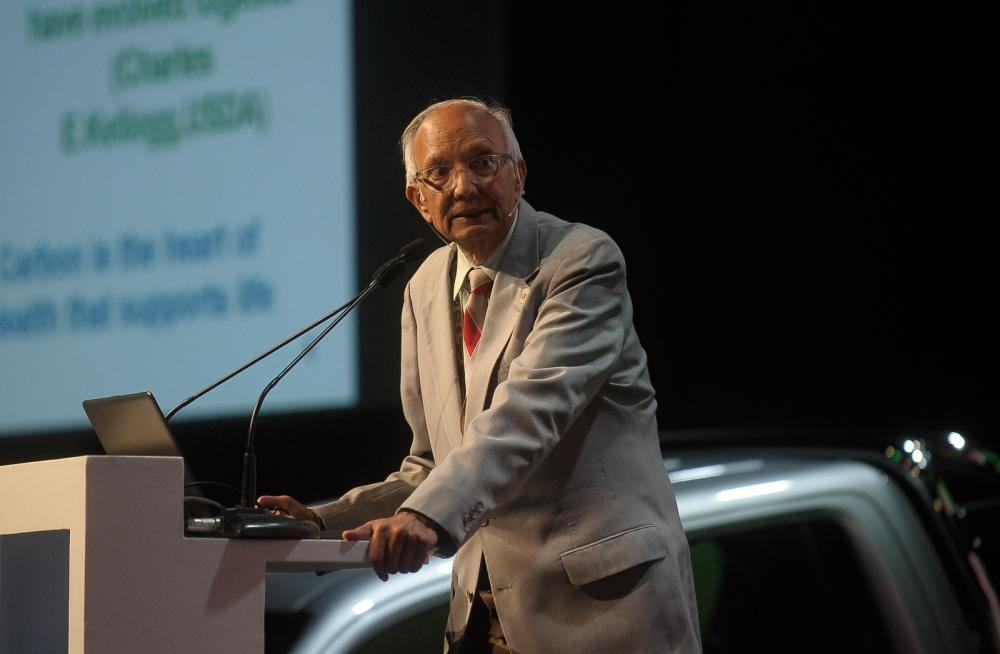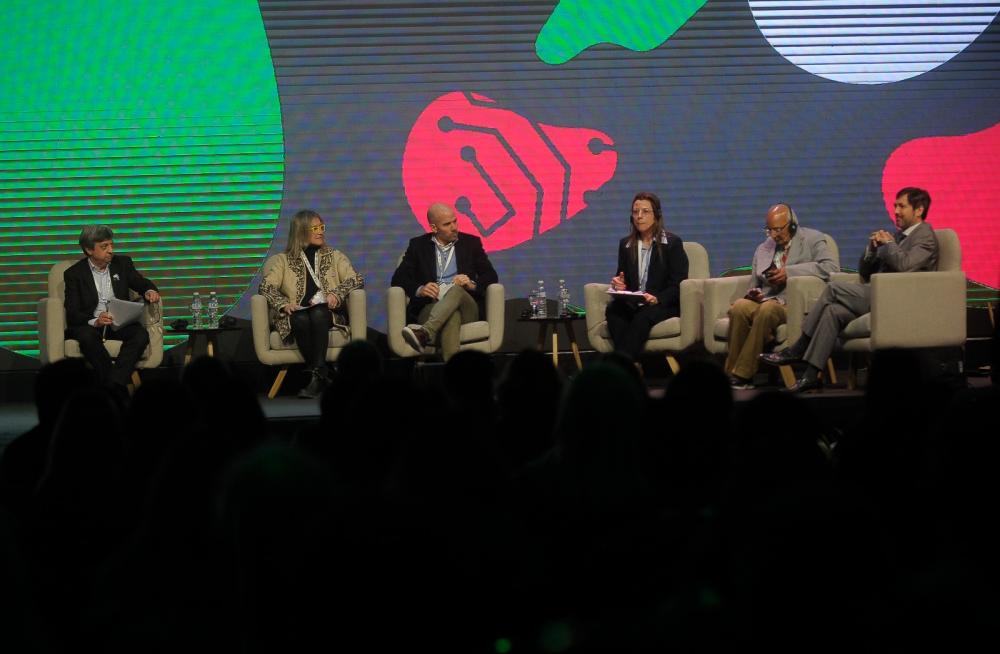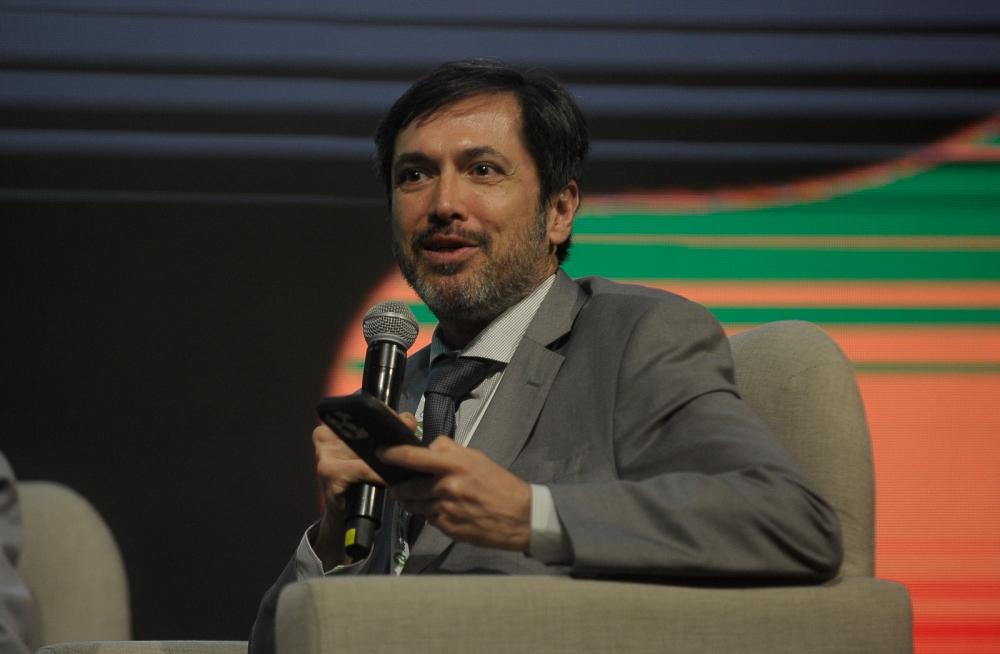Carbon harvesting, a key tool to enhance agriculture's role as a solution to climate change, was a central topic at the AAPRESID Congress

Buenos Aires, 13 August 2024 (IICA) – Efficiently managed agricultural soils are a carbon sink that can enhance agriculture's role as part of the solution to climate change, according to experiences and lessons discussed by experts, producers, and private sector representatives in Buenos Aires during the Congress of the Argentine Association of No-till Farmers (AAPRESID).
The event, held at La Rural in Argentina's capital, attracted around 7,500 attendees and featured over 100 conferences over three days.
Carbon harvesting in the agenda of sustainable agriculture was one of the central topics in the special section of the congress that AAPRESID designed in collaboration with the Inter-American Institute for Cooperation on Agriculture (IICA), focusing on perspectives and opportunities for producers offered by agri-food systems in the Americas.
In this context, one of the agreements was that science and innovation are the paths through which agriculture can increase carbon absorption in soils, an action that contributes to climate change mitigation and is unique to this sector.
AAPRESID is a network of Argentine farmers committed to agricultural sustainability, recognized regionally and internationally for innovation, and has a strategic alliance with IICA.
Their annual congress, held for the first time in Buenos Aires, brought together agriculture leaders to discuss innovation scenarios, focusing on science and technology, agricultural transformation, and climate change mitigation and adaptation.

Need for Incentives
A key consensus from a panel was the need for agricultural producers who absorb carbon in the soil through sustainable practices to be economically rewarded for the ecosystem services they provide. This panel featured Rattan Lal, considered the foremost authority in soil sciences.
Alongside Lal, who is a Goodwill Ambassador for IICA, were Marcelo Torres, President of AAPRESID; María Beatriz Pilu Giraudo, Vice President of the National Agricultural Technology Institute (INTA) of Argentina; Juan Farinati, President of Bayer Cono Sur; and Francisco Mello, International Specialist in Carbon Sequestration and Climate Change at IICA.
Professor Lal has been leading the Living Soils of the Americas Program with IICA since 2020, which promotes the conservation of this essential resource for production. The program has already achieved results in various countries in the region.
During his presentation, Lal mentioned that the project is expanding to Africa. “Given its experience in the Americas, IICA has an important role to play in soil restoration in Africa, which is vital for global food security,” he stated.
The scientist, who won the World Food Prize in 2020, explained that essentially, all life on the planet depends on soil health, which is a global heritage. “No one, simply because they have a title deed, which is just a piece of paper, should think that soil is their exclusive property,” he said.
“We need to harvest carbon in soils –he added– through regenerative agriculture, a broad concept that includes precision agriculture, artificial intelligence, no-till farming, cover crops, and biofortification of crops to combat hunger. The challenges are soil erosion, eutrophication, and greenhouse gas emissions. We need to make agriculture part of the solution.”
Lal stated that the agricultural sector must set clear, achievable goals, such as reducing cultivated land by half, decreasing fertilizer use, and doubling grain production yields by the end of this century. This way, the activity will increasingly absorb more carbon in the soil.

The Value of IICA
Marcelo Torres praised IICA's role in connecting the scientific system with producers in the Americas. “We have an increasingly close and deep relationship with the Institute,” he highlighted.
Torres explained that Argentine producers turned to direct seeding due to problems with soil erosion, yields, and resistant weeds.
“We have identified climate-smart models. Producers adopt them because they benefit from them, but to scale these practices, incentives are needed. Producers need to feel that being more sustainable not only affords them a clear environmental conscience, which is not insignificant, but also provides profitability,” he said.
Juan Farinati described the Pro Carbono program, which Bayer has been working on for the past three years with 160 producers in Argentina. “We achieved a 9% increase in 6 or 7 years of trials with regenerative agriculture. We also reduced input use by 15% and cut greenhouse gas emissions by 51%. We have the information and knowledge proving that regenerative agriculture and productivity can go hand in hand,” he explained.
Giraudo highlighted IICA's role as a unifier of public research institutes on the continent and noted that today, for agriculture, producing more with less is a mandatory requirement, which includes a smaller environmental footprint, renewable energy use, designing resilient systems, and preserving biodiversity.
“It seems impossible – she said – to tackle this task. But it can only be done through research, science, and continuous development of indicators. National agricultural research institutes have a fundamental role in this strategy, but we must not work in isolation but as a collaborative team.”
“The challenge – she concluded – is not to think about expanding the agricultural frontier but about multiplying productivity using tools like biotechnology and gene editing. This goal is achievable with science, technology, and public-private collaboration.”
The conclusions of the meeting were presented by Francisco Mello, who noted that healthy agricultural soils, as a carbon sink, sustain life on the planet.
Regarding the collective work being done on the continent, Mello emphasized the importance of the Living Soils of the Americas Program as a bridge between the public and private sectors. He also highlighted the cutting-edge work being done by the Brazilian Agricultural Research Corporation (EMBRAPA), which created a carbon calculator, a tool for measuring the environmental impact of soybean production.
“There is much being done in the region – Mello reviewed – without forgetting, of course, no-till farming, which has positive impacts on carbon absorption. When we look at the entire continent, we see that there is great potential for agriculture to absorb more carbon in the soil and achieve a climate-positive balance.”
More information:
Institutional Communication Division.
comunicacion.institucional@iica.int